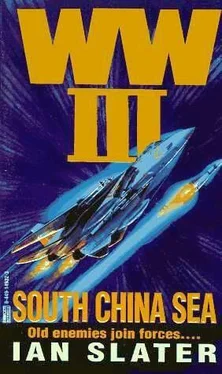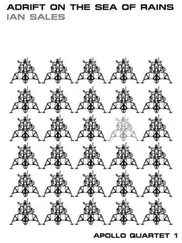“Gurkhas,” Cline said.
“Exactly,” Freeman said, slapping him on the shoulder. “And mention the Aussies, New Zealanders, South Koreans…” He steered Cline away from the Vietnamese general and cadre and toward his heavily loaded troops, his voice subdued. “But Bob, for Chrissake don’t say anything about the Japanese support — not even logistical support. These jokers in Hanoi, like much of Asia, hate the Japanese — figure the Japs still haven’t made amends for atrocities.”
“How about our My Lai?” Cline asked, reminding Freeman of the massacre of a whole Vietnamese village by U.S. troops.
“Bad as it was, Bob, it doesn’t start to compare with the widespread rape and pillage perpetrated by the sons of Nippon — sons of bitches traumatized the whole of Southeast Asia. And Bob…?”
“Sir?”
Freeman’s voice was friendly enough as he smiled back at the Vietnamese general and cadre before saying quietly to his aide, “Bob, coming down the ramp I heard some joker use the word ‘gook.’” Now Freeman was smiling broadly. “You tell ‘em if I hear any disparaging remarks about our U.N. allies, I will personally cut the offender’s prick off. You got that?”
“Yes, General.”
General Vinh asked in heavily accented English how long Freeman wanted to rest his troops before moving up to the snake — the name given by the Vietnamese Army to the winding front line that snaked its way up, down, and at times around the base of the hills north of Hanoi.
“Rest?” Freeman responded. “General, we didn’t come here to rest. Vietnamese people are being attacked by China, the U.N. sent us to help, and that means now. We can move out the moment my boys finish relieving themselves. Main body of Second Army in—” He almost said Japan. “—is already assembling for airlift. First planeload’ll be here in a matter of days.”
General Vinh understood most of it, except for the part about “relieving” themselves.
“Gia ve sinh,” the interpreter explained.
“Yes,” Freeman cut in. “Gia ve sinh,” adding, “Thunder box!”
When this was explained to General Vinh, he uttered an “Ah…” of recognition, smiling broadly. “Toi —Come,” he said, motioning to a line of ten three-ton trucks — all American made — looking the worse for wear, their engines spitting and coughing in two lines beyond four portable toilets that had been rolled into the apron of light about the Hercules.
As the trucks, their “blackout” headlights mere slits of light in the enormous darkness, rolled north from the Gia Lam airfield, Freeman’s spearhead troops, whose main function now was to carry out a recon in force for the benefit of Second Army, heard the sound of clapping in the darkness. Through their infrared goggles, against a soupy green background, they could see lines of Vietnamese civilians clapping here and there and waving tiny U.S. and U.N. flags.
“Ain’t that somethin’?” D’Lupo said, taking his infrareds off, as he, like others, was prone to severe headache from the goggles if he left them on too long. “Gooks welcoming U.S. soldiers. I’m gonna tell my grandchildren ‘bout this one.”
“You’ll tell nobody, D’Lupo,” a Delta first lieutenant said, “if you keep callin’ ‘em gooks. Remember what the general said — he’ll cut your prick off!”
“All right,” D’Lupo riposted. “I’ll call ‘em ‘Charlie.’ “
“Shit,” Martinez cut in. “You tryin’ to sound like a vet?”
“Listen, dick brain, I figure in a coupla hours we’ll start being vets.”
“If you last that long,” Martinez said.
“Thanks a lot, Marty,” D’Lupo charged. “You’re all laughs, you know that?”
Dave Rhin, a black man from Chicago, flicked up his IR goggles. “Man, there are thousands of ‘em lined up. See ‘em plain as day.”
“Yeah,” D’Lupo said in the rough camaraderie of soldiers. “Well, they’re gonna find it hard to see you, Rhin.”
“I told you,” Martinez chimed in, “to use that fuckin’ sunscreen, Rhin!”
“Hey, dick brain,” Rhin retorted, “they gonna see you honkies all right. They don’t need no IRs to see you, man.”
“Oh,” Doolittle said to his fellow SAS troopers in the truck, “isn’t this nice? We’re on our way to a punch-up wiv Charlie an’ these blokes start a fuckin’ race riot. Lovely, i’n’it?”
“Can’t understand a fuckin’ word you say, limey,” Rhin said.
“No matter,” Martinez joshed, flicking up his IRs. “Brits are full of shit anyway.”
“You’ll get yours, mite!”
“All right,” the first lieutenant said on the cellular. “Pipe down. We’ll be in enemy country before you know it. General wants you all quiet as of now.”
The silence was deafening. Freeman had permitted them to let off steam on the way in from the Gia Lam Field. But now that they were past the Ho Tay — West Lake — approaching the Song Hong, or Red River, and Thang Long Bridge, a prime target for U.S. bombers during the Vietnam War, every one of the 127 men, including Freeman, was alone with his fear.
Marte Price had wanted to stay in Hanoi to cover the war, but the CNN crew of three had decided to go to the front, and being the only woman reporter, she felt she would lose face not only for herself but for all the women in the armed services if she didn’t go with Freeman’s spearhead recon group. Someone had joked she’d decided to go “all the way,” but there were no laughs.
Sitting in the second armed Humvee behind the vehicle carrying Freeman, Cline, and the two Vietnamese, Marte Price was sick with fear. She found, to her astonishment, that one’s teeth really do chatter in the face of a danger so overwhelming that she felt a shortness of breath — a rapidly rising surge of panic that momentarily convinced her she was having a heart attack.
* * *
Southwest of Hanoi, in the Vietnamese People’s Army indoctrination center at Xuan Mai, Vietnamese militia and reservists were being told once again that it was not the American people in the sixties and early seventies who had declared war on the freedom-loving peoples of Vietnam but the “imperialist criminals” Kennedy, Johnson, and McNamara. The fact that the U.S. had never actually declared war, attested to by the Pentagon’s insistence on still writing about the war with a lowercase w, was not mentioned.
The American people, continued the cadre, had had their own civil war and a war of independence against the British imperialists. Very few of those listening were paying much attention to the cadre’s harangue. All they cared about was that in Vietnam’s never-ending struggle — the first Indochina War, the second Indochina War, and the wars against the Chinese— war had been the way of life. Peace was the abnormal condition.
This time it was again China, which had had its eyes on the lush Red River Delta since two hundred years before Christ. The Vietnamese soldiers didn’t need a cadre to tell them the obvious: their country was again under attack by the Chinese. No one bothered raising the theoretical contradiction of one Communist state waging war on another Communist state, for everyone understood that this was a war not of ideology but for territory, the rich deposits of oil beneath the hundreds of offshore islands from the Gulf of Tonkin to Borneo. In any case, the Americans had helped the Vietnamese once before, giving them arms and money to fight the Japanese in Vietnam. War was the way of life.
The militia and reservists were told that should it become necessary, they might have to fight side by side with the Americans to plug any gaps the Chinese attack might open. Most of the subdued talk among the young militia and reservists, many of them women, was of how anxious they were to fight with the Americans. Most of them were too young to have fought in America’s undeclared war against North Vietnam, and the same would be true for many, though not all, of the Americans. Besides, it was a well-known fact that Americans had everything, and there was a collective craving among the Vietnamese militia and reservists for American cigarettes. Not only were they the best cigarettes in the world, but in many transactions throughout Southeast Asia they had become the currency of exchange, a prime cargo for the South China Sea pirates.
Читать дальше












